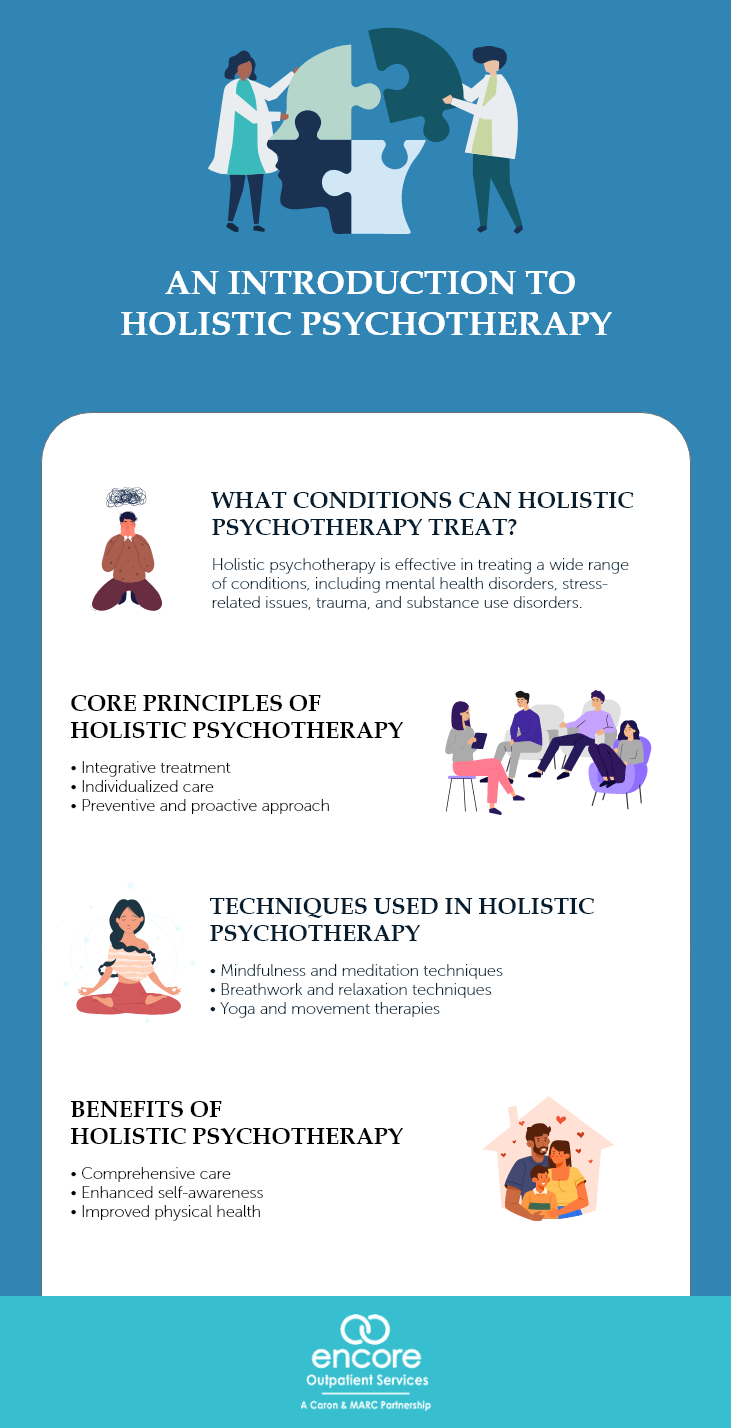Our dedication lies not just in treating symptoms but in addressing the root causes, offering a holistic approach that integrates the best of therapeutic practices with the warmth of community support.
An Introduction to Holistic Psychotherapy

Holistic psychotherapy, also known as holistic therapy, is a therapeutic approach that seeks to address an individual’s mental, emotional, physical, and spiritual well-being as interconnected components of overall health. This form of therapy goes beyond traditional methods by integrating various conventional and alternative techniques to engage the whole person. It’s grounded in the understanding that mental health issues can manifest physically, and likewise, physical ailments can impact mental well-being. The primary objective of this therapy is to identify and address the root causes of substance use disorders and psychological distress rather than solely alleviating symptoms. This article provides an overview of holistic psychotherapy and outlines its various benefits.
What Conditions Can Holistic Psychotherapy Treat?
Holistic psychotherapy can be used to treat a wide array of mental health conditions, emotional challenges, and life stresses. According to the National Institute of Mental Health (NIMH), it can help individuals with specific mental health conditions such as:
- Anxiety Disorders – Including generalized anxiety disorder, panic attacks, and social anxiety, where psychotherapy helps in managing symptoms and developing coping strategies.
- Depression – Treatment focuses on alleviating symptoms of depression, such as persistent sadness and lack of motivation, through various therapeutic techniques.
- Stress-Related Issues – Holistic therapy aids in managing stress and its physical and psychological manifestations, promoting healthier coping mechanisms.
- Trauma and Post-Traumatic Stress Disorder (PTSD) – Holistic therapeutic approaches are used to process trauma and reduce the symptoms of PTSD.
- Substance Abuse and Addiction – Holistic therapy can support the recovery process, addressing underlying issues and triggers for substance use challenges.
- Eating Disorders – Treatment includes addressing the psychological aspects of eating disorders and fostering a healthier relationship with food and body image.
- Personality Disorders – Holistic therapy assists in managing symptoms and improving interpersonal relationships and self-awareness.
- Obsessive-Compulsive Disorder (OCD) – Therapy helps in reducing compulsive behaviors and obsessive thoughts.
- Mood Disorders – This includes conditions like bipolar disorder, where psychotherapy plays a role in mood stabilization and coping with mood swings.
- Relationship and Family Issues – Holistic psychotherapy can help resolve interpersonal conflicts and improve communication and dynamics within relationships and families.
- Grief and Loss – Therapy provides support in coping with the emotional pain of loss and finding ways to adjust to life changes.
This comprehensive approach, addressing the mind, body, and spirit, makes it an effective treatment for these and other conditions, promoting overall well-being and personal growth.
Core Principles of Holistic Psychotherapy
The core principles of holistic psychotherapy revolve around a comprehensive approach to mental health care, emphasizing the interconnectedness of various aspects of an individual’s life. Key principles include:
- Integrative Treatment – Holistic psychotherapy integrates various therapeutic methods, combining traditional psychological techniques with alternative therapies to address mental, physical, and spiritual well-being.
- Individualized Care – Recognizing that each person is unique, this approach tailors treatments to meet the specific needs and circumstances of the individual rather than adopting a one-size-fits-all methodology.
- Mind-Body-Spirit Connection – Central to holistic psychotherapy is the belief that mental, physical, and spiritual health are deeply interconnected, and issues in one area can impact others. Therapists work to address all these aspects in a harmonious manner.
- Empowerment and Self-Awareness – Holistic therapy aims to empower individuals by fostering self-awareness and personal growth, enabling them to understand and address their needs effectively.
- Preventive and Proactive Approach – Instead of merely reacting to symptoms, holistic psychotherapy often focuses on lifestyle changes and self-care practices to prevent issues from arising or worsening.
By adhering to these principles, holistic psychotherapy seeks to provide a more comprehensive and personalized treatment experience, aiming for long-term well-being rather than just symptom relief.

Types of Psychotherapy
There are several types of psychotherapy, each with its own approach to addressing mental health concerns and emotional challenges. Some of the most common types of psychotherapy include:
- Cognitive Behavioral Therapy (CBT) – Focuses on identifying and changing negative thinking patterns and behaviors. It’s widely used for treating anxiety, depression, and other mental health disorders.
- Dialectical Behavior Therapy (DBT) – Combines CBT techniques with mindfulness practices. DBT is particularly effective for treating personality disorders and managing self-destructive behaviors.
- Psychodynamic Therapy – Explores unconscious processes and past experiences to understand current behavior. It’s often used to delve into deep-seated emotional issues and long-standing patterns.
- Humanistic Therapy – Centers on the individual’s capacity for self-awareness and personal growth. It emphasizes the importance of a person’s subjective perspective and the journey to self-actualization.
- Interpersonal Psychotherapy (IPT) – Primarily used for treating depression, IPT focuses on improving interpersonal relationships and communication patterns, helping individuals resolve conflicts and adapt to changes in life.
- Family Therapy – Involves treating a family as a unit to heal relationships and improve communication. It’s beneficial for addressing issues like marital problems, parent-child conflicts, and the impacts of mental illness on the family.
- Group Therapy – Conducted with a group of individuals under the guidance of a therapist. It provides a supportive environment for individuals to share experiences and learn from each other.
- Music and Art Therapy – Utilizes creative arts as a therapeutic tool to express emotions and thoughts non-verbally. It’s useful for individuals who struggle to articulate their feelings through traditional talk therapy.
- Person-Centered Therapy – Also known as client-centered therapy, this approach focuses on the individual’s unique experiences and perspectives, encouraging self-exploration and personal growth.
- Solution-Focused Brief Therapy (SFBT) – Concentrates on finding solutions in the present time and exploring one’s hope for the future. It’s goal-directed and focuses on the future rather than past problems.
Each type of psychotherapy offers unique approaches to treatment, catering to different needs and conditions. The type of therapy depends on individual preferences, the nature of the issues being addressed, and the desired outcomes.
Techniques Used in Holistic Psychotherapy
Holistic psychotherapy employs various techniques to promote overall well-being.
Key techniques include the following:
- Mindfulness and Meditation – These practices are central to holistic therapy, helping individuals cultivate a state of awareness and presence in the moment. They are effective in reducing stress and improving emotional regulation.
- Breathwork and Relaxation Techniques – Techniques like deep breathing exercises are used to calm the nervous system and reduce symptoms of anxiety and stress.
- Yoga and Movement Therapies – Incorporating physical elements like yoga or tai chi to connect the body and mind, aiding in the release of physical tension and emotional blockages.
- Diet and Nutritional Counseling – Providing guidance on nutrition to support overall physical health, which in turn impacts mental well-being.
- Nature-Based Therapies – Utilizing the therapeutic benefits of nature, such as eco-therapy or animal-assisted therapy, to enhance mental wellness.
- Holistic Lifestyle Changes – Advising on lifestyle adjustments, like sleep patterns and exercise routines, to support holistic health.
- Visualization – These techniques use mental imagery to create positive and calming experiences to foster relaxation and positive emotions.
These techniques are often used in combination, tailored to the individual’s needs, to provide a comprehensive approach to mental health care.
Benefits of Holistic Psychotherapy
Holistic psychotherapy offers several benefits, making it an effective approach for a wide range of individuals seeking mental health support:
- Comprehensive Care – Holistic psychotherapy ensures a comprehensive approach to treatment, addressing multiple facets of an individual’s well-being.
- Enhanced Self-Awareness – This therapy encourages individuals to develop a deeper understanding of themselves, their emotions, thoughts, and behaviors, fostering greater self-awareness and personal growth.
- Stress Reduction – Techniques like mindfulness, meditation, and relaxation exercises are integral to holistic psychotherapy, significantly aiding stress reduction and management.
- Improved Physical Health – With its emphasis on the mind-body connection, holistic therapy often includes guidance on nutrition, exercise, and relaxation techniques, which can lead to improved physical health.
- Emotional Healing – Holistic therapy provides a safe space for emotional expression and healing, addressing issues like trauma, grief, and substance use disorders in a supportive and nurturing environment.
- Personal Empowerment – Patients are often encouraged to take an active role in their healing process, leading to a sense of empowerment and self-efficacy.
- Long-Term Wellness – Holistic therapy aims to alleviate symptoms and equip individuals with tools and strategies for long-term mental health and well-being.
- Flexibility and Personalization – The variety of techniques available allows therapists to tailor treatment plans to the specific needs and preferences of each individual.
- Preventative Approach – By focusing on overall well-being and healthy lifestyle choices, holistic psychotherapy can play a role in preventing mental health challenges from developing or worsening.
- Improved Quality of Life – Holistic psychotherapy contributes to an improved overall quality of life, including better physical health, enhanced relationships, and a greater sense of fulfillment.
The benefits of holistic psychotherapy make it a valuable option for those seeking a more integrated approach to mental health care, promoting overall well-being and personal development.
What to Expect From Holistic Psychotherapy?
When engaging in holistic psychotherapy, individuals can anticipate a unique therapeutic experience that differs from traditional therapy in several ways:
- Initial Assessment – The therapist will conduct a comprehensive assessment, considering psychological symptoms and physical health, lifestyle, and spiritual beliefs. This helps in creating a personalized treatment plan.
- Diverse Techniques – Patients are introduced to a variety of techniques, such as mindfulness, meditation, creative art therapy, and relaxation exercises. Holistic techniques depend on the individual’s specific needs and preferences.
- Focus on Self-Exploration – Holistic psychotherapy often emphasizes deep self-exploration and discovery. Patients are encouraged to reflect on their thoughts, emotions, and behaviors and how these are interconnected with their physical and spiritual well-being.
- Active Participation – Individuals are expected to play an active role in their therapeutic process. This could include participating in activities or exercises during sessions and applying learned strategies in their daily life.
- Regular Review and Adaptation – Treatment plans are regularly reviewed and adapted based on individual progress and evolving needs.
- Safe and Supportive Environment – Therapists provide a non-judgmental, empathetic, and supportive environment, encouraging open and honest communication.
- Long-Term Perspective – Holistic psychotherapy often takes a long-term perspective, focusing on sustainable changes and strategies for ongoing personal development.
Understanding what to expect can help individuals feel more prepared and comfortable as they embark on their journey in holistic psychotherapy.
Encore Outpatient Services offers a path to recovery and well-being through a personalized and holistic approach to psychotherapy. Our experienced clinicians specialize in treating a range of challenges, including substance use disorders, trauma, and mental health challenges. By integrating traditional therapeutic methods with innovative practices, we ensure a comprehensive treatment experience tailored to each individual’s needs. We are committed to supporting your journey towards health and balance, with a focus on understanding and addressing all aspects of your well-being. Consider the advantages of holistic psychotherapy at Encore Outpatient Services, where your story is valued and your path to recovery is our primary goal.
Let Us Support You On Your Recovery Journey!
Copyright 2026 Encore Outpatient Services | All Rights Reserved



